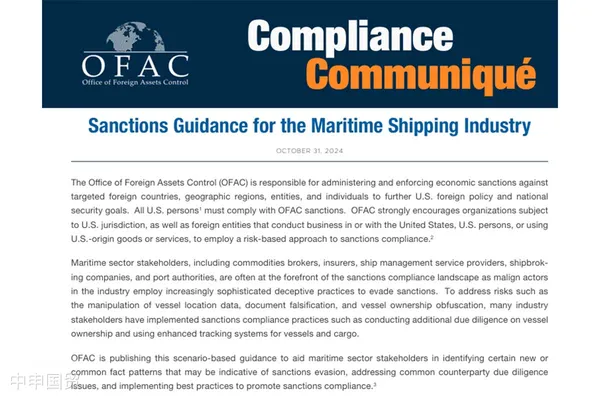- Shanghai Zhongshen International Trade Co., Ltd. - Two decades of trade agency expertise.
- Service Hotline: 139 1787 2118
II. Deceptive Transportation Means and CountermeasuresMaritime TransportationIII. Specially Designated Nationals and Blocked Persons List (SDN List)

IV. Insurance Risks of Vessels with Ambiguous Ownership Structures
OFAC is responsible for administering and enforcing economic sanctions against foreign countries, regions, entities and individuals to support U.S. foreign policy and national security objectives. All businesses that have dealings with the United States must comply with OFACs sanctions regulations. Stakeholders in the maritime industry - such as commodity brokers, underwriters, ship management service providers, port authorities, etc. - are particularly at the forefront of sanctions compliance, as malicious actors in the industry often use sophisticated means to evade sanctions.
To assist maritime enterprises in dealing with deceptive behaviors such as tampering with ship position data, forging documents and obscuring ship ownership, OFAC has issued scenario - based guidance, detailing how to identify sanctions evasion and providing best practices for compliance.
II. Deceptive transportation means and countermeasures
OFACs guidance mentions that some international trading companies conceal their relationships with sanctioned countries through deceptive transportation means. For example, an international oil trading company concealed the transportation of Iranian - origin crude oil through forged certificates of origin. Such practices are often accompanied by the manipulation of Automatic Identification System (AIS) data of ships to show that the ships are at false loading locations.
To address these deceptive behaviors, OFAC recommends that maritime enterprises conduct additional transaction due diligence when reviewing voyage documents involving high - risk areas. For example, check whether there are abnormalities in the AIS data of ships and verify the authenticity of documents to ensure the clear origin and destination of goods.
III. Specially Designated Nationals and Blocked Persons List (SDN List)
In maritime transactions, it is crucial to identify Specially Designated Nationals (SDN) and blocked persons. In a case provided by OFAC, a U.S. ship management company immediately took measures to terminate the contract and self - disclose after discovering that its partner was an entity on the SDN List. OFAC encourages enterprises to take timely action when they find situations that may involve sanctioned persons to avoid further legal risks.
Warning signs include modifying original documents in commercial transactions to hide evidence, suddenly changing transportation instructions, and refusing to provide reasonable information requests. These signs may indicate the risk of sanctions evasion in a transaction.
IV. Insurance risks of vessels with opaque ownership structures
OFAC also emphasizes in its guidance the compliance risks that may arise from opaque ship ownership structures. A non - U.S. ship management company was denied an insurance claim because the ultimate beneficial owner of the ship was a Russian state - owned enterprise. OFAC recommends that maritime enterprises include clear sanctions exemption clauses in their contracts so that they can withdraw from the agreement when sanctions risks are discovered.
V. Mid - voyage sanctions risks and response strategies
If potential sanctions issues are discovered mid - voyage, such as concealing the origin of goods through illegal ship - to - ship (STS) transfers, maritime enterprises should conduct additional due diligence and, if necessary, apply to OFAC for a specific license. OFAC recommends that maritime enterprises include clauses in their contracts to comply with U.S. sanctions regulations so that they can withdraw from such agreements when necessary to ensure corporate compliance.
VI. Opaque ship ownership and risk identification
Opaque ship ownership is one of the common means of sanctions evasion in the maritime industry. In a case from OFAC, a ship broker terminated a tanker sale transaction because it could not obtain detailed information about the buyer. The broker recorded this incident in its internal system to conduct more stringent due diligence on future transactions. OFAC recommends that shipowners, ship brokers and financial institutions conduct risk - based assessments of their counterparties, especially when transactions involve complex ownership structures or shell companies.
VII. Summary
Through the release of the Maritime Industry Sanctions Guidance, OFAC emphasizes the compliance requirements of maritime enterprises in the face of a complex international trade environment. Enterprises need to be vigilant against various deceptive means, including tampering with ship data, concealing the participation of sanctioned persons, and using complex ownership structures. To this end, enterprises should take additional due diligence measures, establish strong internal compliance controls, and include appropriate sanctions exemption clauses in commercial agreements.
For practitioners in the maritime industry, closely following the compliance guidance issued by OFAC and maintaining close cooperation with the compliance team are the keys to effectively reducing sanctions risks. It is hoped that this article can help you better understand the compliance challenges in the maritime industry and provide practical compliance strategies for your enterprise.
Related Recommendations
? 2025. All Rights Reserved. 滬ICP備2023007705號-2  PSB Record: Shanghai No.31011502009912
PSB Record: Shanghai No.31011502009912









